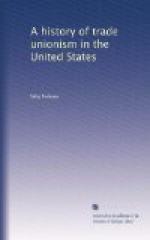After Commonwealth v. Hunt came a forty years’ lull in the courts’ application of the doctrine of conspiracy to trade unions. In fact so secure did trade unionists feel from court attacks that in the seventies and early eighties their leaders advocated the legal incorporation of trade unions. The desire expressed for incorporation is of extreme interest compared with the opposite attitude of the present day. The motive behind it then was more than the usual one of securing protection for trade union funds against embezzlement by officers. A full enumeration of other motives can be obtained from the testimony of the labor leaders before the Senate Committee on Education and Labor in 1883. McGuire, the national secretary of the Brotherhood of Carpenters and Joiners, argued before the committee for a national incorporation law mainly for the reason that such a law passed by Congress would remove trade unions from the operation of the conspiracy laws that still existed though in a dormant state on the statute books of a number of Slates, notably New York and Pennsylvania. He pleaded that “if it (Congress) had not the power, it shall assume the power; and, if necessary, amend the constitution to do it.” Adolph Strasser of the cigar makers raised the point of protection for union funds and gave as a second reason that it “will give our organization more stability, and in that manner we shall be able to avoid strikes by perhaps settling with our employers, when otherwise we should be unable to do so, because when our employers know that we are to be legally recognized that will exercise such moral force upon them that they cannot avoid recognizing us themselves.” W.H. Foster, the secretary of the Legislative Committee of the Federation of Organized Trades and Labor Unions, stated that in Ohio the law provided for incorporation at a slight cost, but he wanted a national law to “legalize arbitration,” by which he meant that “when a question of dispute arose between the employers and the employed, instead of having it as now, when the one often refuses to even acknowledge or discuss the question with the other, if they were required to submit the question to arbitration, or to meet on the same level before an impartial tribunal, there is no doubt but what the result would be more in our favor than it is now, when very often public opinion cannot hear our cause.” He, however, did not desire to have compulsory arbitration, but merely compulsory dealing with the union, or compulsory investigation by an impartial body, both parties to remain free to accept the award, provided, however, “that once they do agree the agreement shall remain in force for a fixed period.” Like Foster, John Jarrett, the President of the Amalgamated Association of Iron and Steel Workers, argued for an incorporation law before the committee solely for its effect upon conciliation and arbitration. He, too, was opposed to compulsory arbitration, but he showed that he had thought out the point less clearly than Foster.




